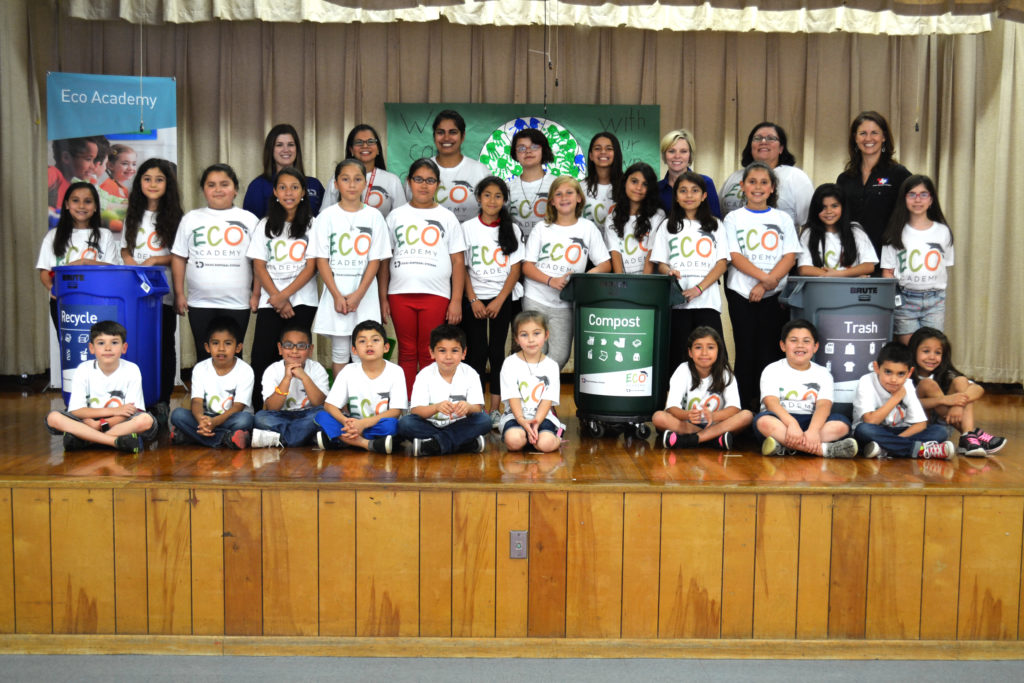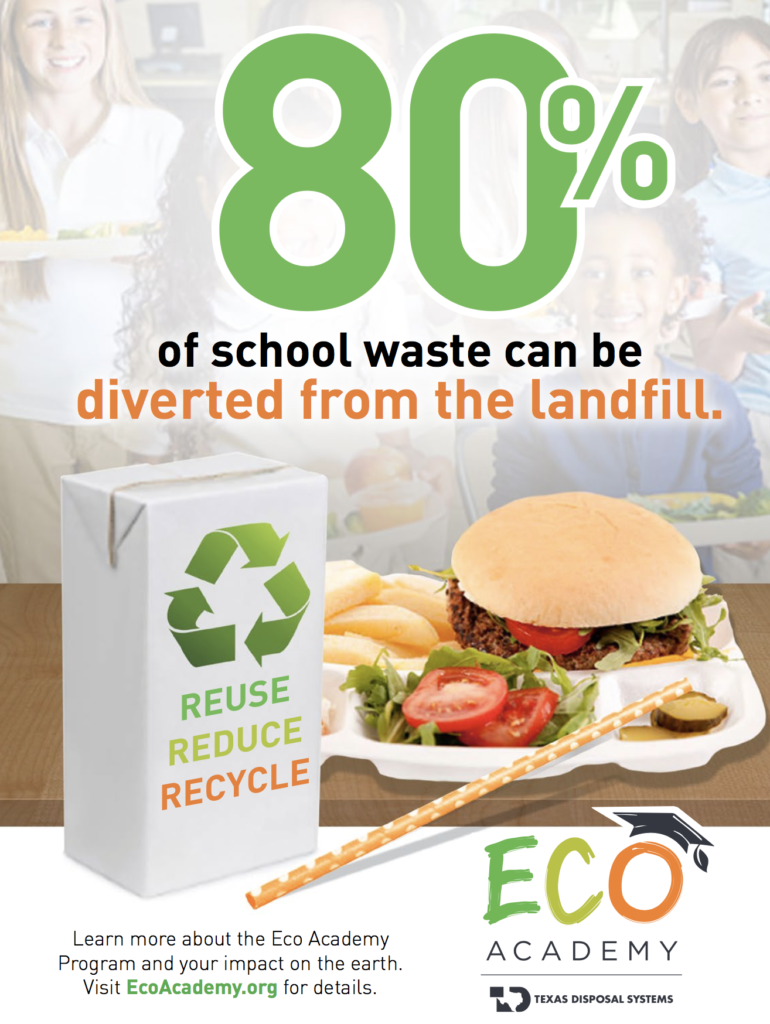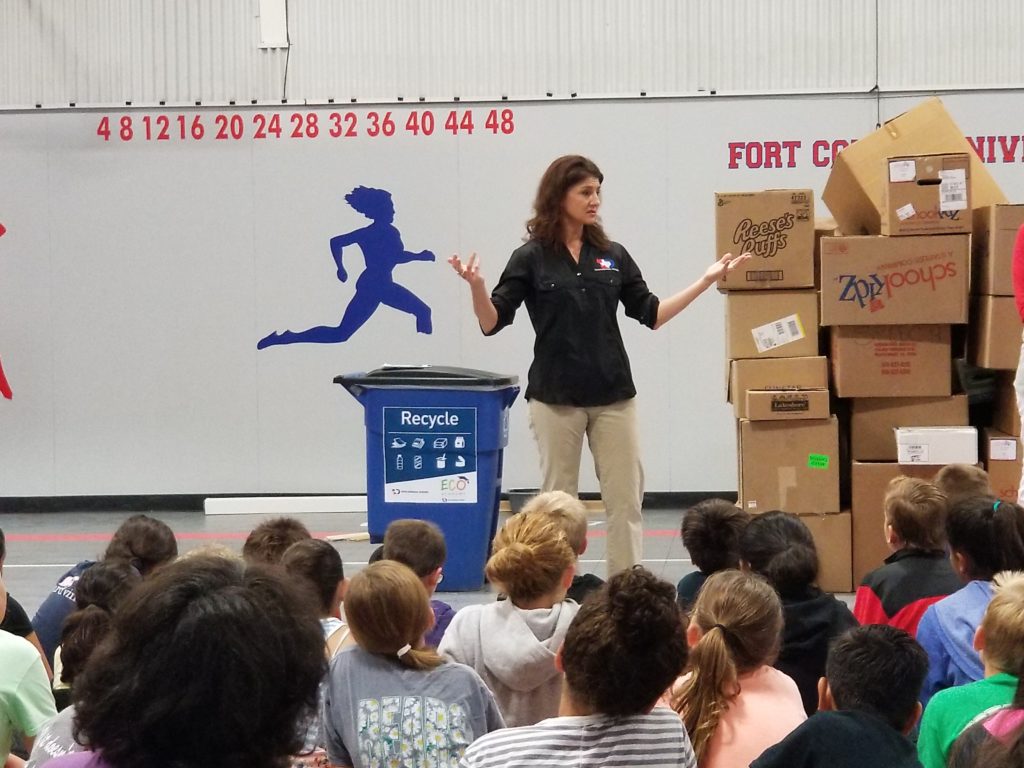Texas Disposal Systems is preaching the importance of recycling, composting and the positive effects by way of the organization’s innovative new program, Eco Academy.
By Lauren Jones, Photos courtesy of Texas Disposal Systems

It’s no secret our natural resources are in dire need of protection, restoration and management. We’re making progress, but even today, Americans produce, on average, approximately 4.4 pounds of waste per day, per person, according to the Environmental Protection Agency, even though 90 percent of our discarded materials can be recycled or composted. What if we all did our best to protect the environment? What if every person recycled, composted or repurposed used items? Imagine what our world could look like then. We can make an immediate impact by continually looking for ways to divert materials otherwise intended for landfill disposal and repurposing them for new life, as well as promoting environmental awareness in our communities and educating others about how to recycle and compost to preserve resources.
Texas Disposal Systems, one of the largest independently operated resource-management companies in the country, promotes living in a cleaner and more beautiful world, which is entirely possible. For more than 40 years, TDS has helped communities, organizations and schools manage and divert waste to beneficial uses. The company provides educational signage for highly attended events, such as the Austin City Limits Music Festival, and offers easy-to-read information on its website, emphasizing the importance of recycling and composting, ultimately helping to divert waste from landfills, which, in turn, reduces greenhouse-gas emissions.

But in order to get people excited about a more sustainable future, education is key. To increase recycling and composting education, TDS recently launched an innovative program called Eco Academy. The program is designed to minimize waste in schools, which is why it includes campus-wide recycling initiatives and compostable-material collection in cafeterias.
The Eco Academy curriculum is helping spread the word throughout Central Texas communities about the importance of recycling and composting by teaching kids how they can help the planet at school and how to take what they’ve learned back to their homes. For example, did you know a potato peel decomposes within a few weeks, but it can take upwards of 200 years for an aluminum can to break down? It’s just one of the things Eco Academy teaches students.
This ripple effect is the key to saving our precious planet. When children start learning these lessons in elementary school, they will grow up to become more environmentally conscious adults. The lessons Eco Academy teaches about the life cycle of trash are steps in the right direction toward making our communities and, eventually, our world more environmentally sustainable.
Each school participating in the Eco Academy program receives prepared curriculum with hands-on activities and videos, plus educational signage that’s perfect for hanging up in cafeterias and classrooms. The lessons cover such themes as ways to reduce waste, how to conserve natural resources and designing solutions for the future. By the end of fall 2017, Eco Academy will be in Central Texas elementary schools, and there are plans to expand the program to both middle and high schools by the end of 2018.

Imagine all the good that can come if we all took the time to get a little more educated about what we can do for our planet. Small changes to our daily habits can have a significant impact on our environment. Even if it’s just throwing your leftovers in the compost bin, buying compostable utensils or taking five minutes in the morning to send your child to school with snacks packed in a reusable container, we can do our part in helping the planet. Let’s all make more of an effort to be good stewards of our environment while we still have time to make a difference.
Five Ways Parents Can Help Reduce Their Child’s Carbon Footprint
- Avoid the back-to-school shopping spree. Look around the house for notebooks, pens, pencils and other items on the list. You may find you have extra from the previous year.
- Head to the consignment store. Shop the racks for gently used clothing. You may be surprised by what you find.
- Start a carpool. If you aren’t carpooling already, this is a simple way to reduce greenhouse-gas emissions. Set up a carpool group and take turns driving to and from school.
- Say goodbye to plastic water bottles. Even though bottled water is convenient, think about sending your child to school with a reusable bottle. Not only is it better for the planet, but plastic bottles also contain chemicals that can seep into our water.
- Recycle and compost at home. One of the best ways to get your child excited about recycling is to start at home. Assign labeled containers for recycling plastics, glass and paper, and start a compost pile in your backyard.
To learn more about Texas Disposal Systems and Eco Academy, visit ecoacademy.org.


